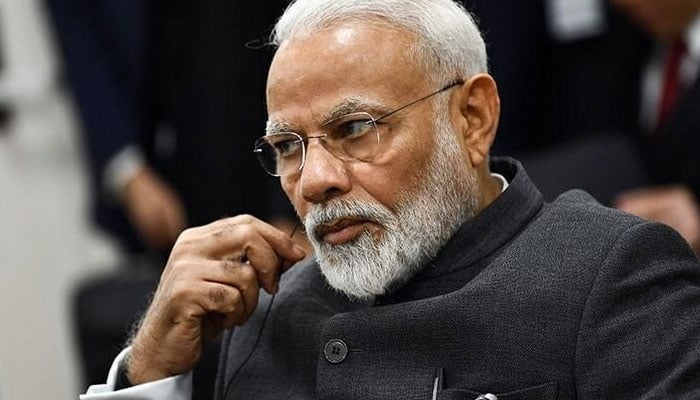Kashmir, Modi and Pakistan
Kashmir dispute remains contentious issue, and dialogue must be rooted in sincerity and genuine commitment to addressing this and other core concerns
Deputy Prime Minister and Foreign Minister Ishaq Dar has made an important articulation: Pakistan’s aspiration for normalized regional relations – including with India. Mr Dar’s remarks at the 51st founding anniversary of the Institute of Strategic Studies Islamabad (ISSI) reflect a pragmatic recognition of the socio-economic challenges that plague South Asia. By advocating for better relations with India on the basis of mutual respect, sovereign equality, and a just and peaceful resolution of the long-standing Occupied Kashmir issue, the timing of his overture is noteworthy, coinciding with the early days of Narendra Modi’s third term as prime minister of India. None of this is or can be smooth sailing, however. Modi’s initial hardline stance on Pakistan, juxtaposed with his domestic focus due to recent electoral setbacks, presents a complex dynamic.
The Kashmir dispute remains a deeply contentious issue, and any dialogue must be rooted in sincerity and a genuine commitment to addressing this and other core concerns. Modi in the meanwhile shows few signs of having changed much. Last week, he led hundreds of people performing yoga in Indian Illegally Occupied Jammu and Kashmir (IIOJK). Before that, he had announced that preparations for assembly elections had already started in IIOJK and the occupied territory’s statehood would be restored soon. On August 5, 2019, India under Modi had scrapped Article 370 in Indian-Occupied Kashmir, and since then the Modi junta has been treating the Kashmiris even worse than usual, also altering the demographic structure of the occupied territory. It must be noted that the last assembly elections in Occupied Kashmir were held in 2014, and it has been under President’s Rule for nearly six years.
Due to the BJP’s Kashmir policy, there are tensions over the constitutional autonomy of the disputed region and multiple demands for rollback. Despite Modi’s latest announcement, there is scepticism. Congress has also asked the ruling party why it is so scared of elections in the disputed region. It is quite apparent that while the BJP abrogated Article 370 and the Indian Supreme Court upheld the Modi government’s decision, it has angered the people of Occupied Kashmir who were already suffering at the hands of the Indian state and now have literally and virtually no voice. There have been arbitrary arrests of journalists, politicians and human rights defenders in the occupied territory by the oppressive Indian state. Even an accomplished Indian author like Arundhati Roy will be prosecuted under the notorious Unlawful Activities (Prevention) Act (UAPA) for allegedly making a provocative speech at an event in New Delhi in 2010 where she had said that Kashmir “has never been an integral part of India”. Many believe that prosecuting Roy for a speech she made 14 years ago is a desperate move but one that shows how the BJP under Modi remains a fascist party that will harass its opponents and dissenting voices.
There were hopes that after the BJP failed to secure a simple majority in the recent elections, it would learn some lessons. Perhaps, Pakistan too has been looking for signs of that. However, Modi’s recent actions hardly bode well for peace. That said, the Modi government’s promise of restoring statehood in IIOJK and holding assembly elections there is also a tacit admission that their Kashmir policy was a resounding failure. Whether statehood will be restored or not remains to be seen and the same can be said for assembly elections. If the Modi government is serious about these things, it should start by releasing all those it incarcerated after the abrogation of Article 370. And then think about resolving the Kashmir issue. The region needs peace, and without Occupied Kashmir being free that peace will likely remain elusive.
-
 Winter Olympics 2026: When & Where To Watch The Iconic Ice Dance ?
Winter Olympics 2026: When & Where To Watch The Iconic Ice Dance ? -
 Melissa Joan Hart Reflects On Social Challenges As A Child Actor
Melissa Joan Hart Reflects On Social Challenges As A Child Actor -
 'Gossip Girl' Star Reveals Why She'll Never Return To Acting
'Gossip Girl' Star Reveals Why She'll Never Return To Acting -
 Chicago Child, 8, Dead After 'months Of Abuse, Starvation', Two Arrested
Chicago Child, 8, Dead After 'months Of Abuse, Starvation', Two Arrested -
 Travis Kelce's True Feelings About Taylor Swift's Pal Ryan Reynolds Revealed
Travis Kelce's True Feelings About Taylor Swift's Pal Ryan Reynolds Revealed -
 Michael Keaton Recalls Working With Catherine O'Hara In 'Beetlejuice'
Michael Keaton Recalls Working With Catherine O'Hara In 'Beetlejuice' -
 King Charles, Princess Anne, Prince Edward Still Shield Andrew From Police
King Charles, Princess Anne, Prince Edward Still Shield Andrew From Police -
 Anthropic Targets OpenAI Ads With New Claude Homepage Messaging
Anthropic Targets OpenAI Ads With New Claude Homepage Messaging -
 US Set To Block Chinese Software From Smart And Connected Cars
US Set To Block Chinese Software From Smart And Connected Cars -
 Carmen Electra Says THIS Taught Her Romance
Carmen Electra Says THIS Taught Her Romance -
 Leonardo DiCaprio's Co-star Reflects On His Viral Moment At Golden Globes
Leonardo DiCaprio's Co-star Reflects On His Viral Moment At Golden Globes -
 SpaceX Pivots From Mars Plans To Prioritize 2027 Moon Landing
SpaceX Pivots From Mars Plans To Prioritize 2027 Moon Landing -
 J. Cole Brings Back Old-school CD Sales For 'The Fall-Off' Release
J. Cole Brings Back Old-school CD Sales For 'The Fall-Off' Release -
 King Charles Still Cares About Meghan Markle
King Charles Still Cares About Meghan Markle -
 GTA 6 Built By Hand, Street By Street, Rockstar Confirms Ahead Of Launch
GTA 6 Built By Hand, Street By Street, Rockstar Confirms Ahead Of Launch -
 Funeral Home Owner Sentenced To 40 Years For Selling Corpses, Faking Ashes
Funeral Home Owner Sentenced To 40 Years For Selling Corpses, Faking Ashes




